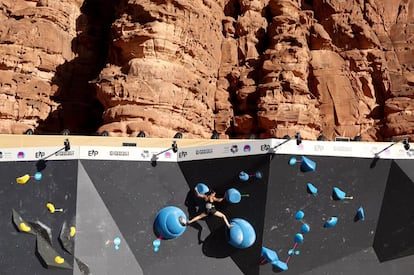Climbing community rejects Saudi Arabia’s money
Sports climbers, mountaineers, guides and professionals from the mountaineering world have urged the international federation to boycott any event in the country

Where Rafa Nadal sees, wherever he looks, “growth and progress” in Saudi Arabia, elite climbers and mountaineers from all over the planet see a dictatorial regime that laughs at human rights and aspires to turn their country into a gigantic sporting Disneyland by buying the will of any actor who can prove useful to them for the purpose of improving their image. As far as is known, climbers competing under the umbrella of the International Federation of Sport Climbing (IFSC) are the first athletes to refuse to compete in Saudi territory. They expressed this stance in a protest letter addressed to the IFSC itself. Later, over 100 mountaineers and other figures from the climbing world issued an open letter through the ACTS For Our Summits association, among them sport climbing’s strongest man, Czech Adam Ondra, American Tommy Caldwell, German Alex Megos, the legendary French climber Catherine Destivelle (a trailblazer and one of the first to climb competitively in the 1980s), and Spaniards Josune Bereziartu and Kilian Jornet, who achieved global recognition after climbing Everest twice in less than a week, without oxygen or fixed ropes, in 2017. Added to these are countless mountaineers, guides, mountain professionals and organizations of all kinds related to the natural environment.
Between November 22 and 24 last year, the IFSC organized a sport climbing competition in Saudi Arabia as part of the so-called NEOM Beach Games, a pure promotional move for the mega-city of the future project, which is to be constructed on the Red Sea coast at a cost of $500 billion. Several sports have already paraded through these games, and those responsible for them have been paid and kept their counsel. Amnesty International has described Neom as an ecological disaster and a violation of human rights. “The climbing community cannot accept that its federation is promoting a project of the sort from the Saudi dictatorial regime. This project results in the violent expropriation of indigenous populations, the killing of political opponents and the irreversible destruction of ecosystems. What was the opinion of the IFSC ethics commission when it was decided that climbing would be part of the NEOM Beach Games?” the signatories of the letter asked.
The climbing community has called on the IFSC to revise its strategic plan for (2020-2028), to create an independent ethics and environmental committee to ensure ecological values and, among other things, to quantify the environmental and social impact of the events it promotes. Likewise, climbers have demanded that the IFSC refrains from collaborating with companies that have a proven negative ecological and human impact. Finally, the IFSC board has been asked to engage in an educational program on the ecological and climate crisis, as well as to introduce a mandatory ecological awareness training module for international athletes and coaches.
If athletes like Jon Rahm or Rafa Nadal have given in to the temptation of oil dollars, the more cynical may suggest that the climbing community’s protests stem from not yet having been showered with generous enough amounts to follow suit. But for the moment, the position of the little guys — of a still growing sport like climbing — is an example and an isolated cry in the wilderness.
Sign up for our weekly newsletter to get more English-language news coverage from EL PAÍS USA Edition
Tu suscripción se está usando en otro dispositivo
¿Quieres añadir otro usuario a tu suscripción?
Si continúas leyendo en este dispositivo, no se podrá leer en el otro.
FlechaTu suscripción se está usando en otro dispositivo y solo puedes acceder a EL PAÍS desde un dispositivo a la vez.
Si quieres compartir tu cuenta, cambia tu suscripción a la modalidad Premium, así podrás añadir otro usuario. Cada uno accederá con su propia cuenta de email, lo que os permitirá personalizar vuestra experiencia en EL PAÍS.
¿Tienes una suscripción de empresa? Accede aquí para contratar más cuentas.
En el caso de no saber quién está usando tu cuenta, te recomendamos cambiar tu contraseña aquí.
Si decides continuar compartiendo tu cuenta, este mensaje se mostrará en tu dispositivo y en el de la otra persona que está usando tu cuenta de forma indefinida, afectando a tu experiencia de lectura. Puedes consultar aquí los términos y condiciones de la suscripción digital.









































